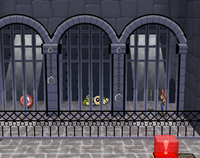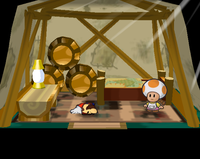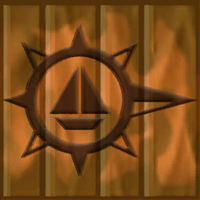Black chest
- “Er, Mario... A word with you? I'm not exactly confident that we can trust this...box.”
- —Professor Frankly, Paper Mario: The Thousand-Year Door
Black chests are a type of treasure chest that appears in Paper Mario: The Thousand-Year Door. There are four of them in total, located in Rogueport Underground, Hooktail Castle, Twilight Town, and Pirate's Grotto. When Mario interacts with a black chest, a being trapped inside the chest pleads for Mario to let them out, which he can do by finding a Black Key. Upon opening the chest, a glowing yellow face emerges and curses Mario. However, the curses benefit Mario, giving him new paper abilities. As such, they are quite similar to the Mad Batter from The Legend of Zelda series.
Listening to Grifty's stories reveals that the beings that "curse" Mario are the souls of the four heroes that defeated the Shadow Queen 1,000 years before the events of the game. She cursed them just before they finished sealing her spirit behind The Thousand-Year Door. The chests are in the spots where the heroes left their Crystal Stars, since the curse took effect after they let go of them.
Abilities[edit]
Plane Mode[edit]
- Main articles: Plane Mode, Plane panel
- Chapter obtained: Prologue (A Rogue's Welcome)
- Power obtained in: Rogueport Underground
- To obtain power: In Rogueport Underground, the player must find a room where the first thing that can be seen is a huge yellow block and a barred entrance to another room. To the right of the room is a blue switch; when the player hits it, a set of stairs is revealed. Ascending the stairs, the player should see a doorway and a paper airplane platform. The player must now drop off the side of the platform to grab the black key, and then jump back up the stairs and enter the doorway to receive the first curse.
- To use power: The player must stand on a plane panel (also known as an airplane panel) and press
 . The player then has to press
. The player then has to press  or land to return to normal.
or land to return to normal. - Hero: The Goomba heroine
Paper Mode[edit]
- Main article: Paper Mode
- Chapter obtained: 1 (Castle and Dragon)
- Power obtained in: Hooktail Castle
- To obtain power: For this power, the player must continue past the room with the black chest. There is a door that leads to a room where the black key is. The floor appears to have spikes in it, but they will not pop up until the player grabs the key. The player then has 50 seconds to navigate their way back out of the spike maze before they get crushed, triggering an instant Game Over. The player then opens the chest and is cursed again.
- To use power: The player must press and hold
 on GameCube, or
on GameCube, or on Switch.
- Hero: The Toad hero
Tube Mode[edit]
- Main article: Tube Mode
- Chapter obtained: 4 (For Pigs the Bell Tolls)
- Power obtained in: Twilight Trail
- To obtain power: The black key is in a shack just outside Twilight Town in Twilight Trail. Before the player can gain this power, they first need the Shop Key to open the storeroom. A fallen tree blocks the path at the end of Twilight Trail. The player has to use Koops to grab the Shop Key on the other side. The player can now open the storeroom to open the chest and be cursed.
- To use power: The player has to press
 and rotate
and rotate  . They can also press
. They can also press  to return to normal. In the Switch remake,
to return to normal. In the Switch remake, is used instead of
.
- Hero: The Boo heroine
Boat Mode[edit]
- Main articles: Boat Mode, Boat panel
- Chapter obtained: 5 (The Key to Pirates)
- Power obtained in: Pirate's Grotto
- To obtain power: In the Pirate's Grotto, the player should see a blown open boat. The player must enter the boat, where they see the evil black chest, waiting to curse them. They must speak to the chest, then fight the Ember that emerges. Upon defeating the ember, a black key drops, which the player can use to open the chest and receive the fourth and final curse.
- To use power: The player must stand on a boat panel and press
 , then press
, then press  again when they reach another boat panel.
again when they reach another boat panel. - Hero: The Koopa hero
Profiles[edit]
- Tattles
- (Before being opened) This is a black chest. Wonder what's inside it...
- (After being opened, GameCube version) This is a black chest. It's empty.
- (After being opened, Switch version) This is a black chest. It doesn't seem like it has anything else to say...
Gallery[edit]
Locations[edit]
The Plane Mode black chest
The Paper Mode black chest
The Tube Mode black chest
The Boat Mode black chest
Locations (remake)[edit]
Other[edit]
A black chest in Paper Mario RPG Special Comic
Names in other languages[edit]
| Language | Name | Meaning | Notes |
|---|---|---|---|
| Japanese | Kuroi Hako |
Black Box | |
| Chinese | 黑色箱子[?] Hēisè Xiāngzi |
Black Box | |
| Dutch | Zwarte kist[?] | Black chest | |
| French | Coffre noir[?] | Black chest | |
| German | Schwarze Truhe[?] | Black Chest | |
| Italian | Forziere nero[?] | Black chest | |
| Korean | 검정상자[?] Geomjeong Sangja |
Black Box | |
| Spanish | Cofre negro[?] | Black chest |
Notes[edit]
- In the section on finding hidden Star Piece panels in the game's instruction booklet, the picture depicts Mario Spin Jumping with Koops in front of the Rogueport Sewers black chest which appears closed. This is a continuity error, as Mario does not acquire Koops as a partner or the Ground Pound ability until sometime after he opens that chest.
- The Boo heroine initially talks using female mannerisms in the Japanese version until the chest is opened; because such gendered speech is difficult to express in English, the English version only vaguely suggests it with a heart at the end of her request. This serves to contextualize why she later asks, "Did you think a lovely lady would pop out or something?"
- In the Switch remake, where all of the characters have audible "speaking voices", the Boo heroine has the highest-pitched voice of the four, which also serves to indicate her gender.
- It is likely that the Crystal Star that was hidden by the Toad was the Garnet Star, since the healer he entrusted it to is referred to as a priest in the Japanese version and some localizations, with the sanctum-keeper of Poshley Sanctum being similarly referred to as a high priest.
















